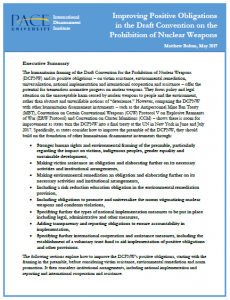 The humanitarian framing of the Draft Convention for the Prohibition of Nuclear Weapons (DCPNW) and its positive obligations – on victim assistance, environmental remediation, universalization, national implementation and international cooperation and assistance – offer the potential for tremendous normative progress on nuclear weapons. They focus policy and legal attention on the unacceptable harm caused by nuclear weapons to people and the environment, rather than abstract and unverifiable notions of “deterrence.”
The humanitarian framing of the Draft Convention for the Prohibition of Nuclear Weapons (DCPNW) and its positive obligations – on victim assistance, environmental remediation, universalization, national implementation and international cooperation and assistance – offer the potential for tremendous normative progress on nuclear weapons. They focus policy and legal attention on the unacceptable harm caused by nuclear weapons to people and the environment, rather than abstract and unverifiable notions of “deterrence.”
However, a new report from the International Disarmament Institute compares the DCPNW with other humanitarian disarmament instruments – such as the Antipersonnel Mine Ban Treaty, Convention on Certain Conventional Weapons Protocol V on Explosive Remnants of War and Convention on Cluster Munitions, showing that there is room for improvement as states turn the DCPNW into a final treaty at the UN in New York in June and July 2017.
Specifically, as states consider how to improve the preamble of the DCPNW, they should build on the foundation of other humanitarian disarmament instruments through:
- Stronger human rights and environmental framing of the preamble, particularly regarding the impact on victims, indigenous peoples, gender equality and sustainable development,
- Making victim assistance an obligation and elaborating further on its necessary activities and institutional arrangements,
- Making environmental remediation an obligation and elaborating further on its necessary activities and institutional arrangements,
- Including a risk reduction education obligation in the environmental remediation provision,
- Including obligations to promote and universalize the norms stigmatizing nuclear weapons and condemn violations,
- Specifying further the types of national implementation measures to be put in place including legal, administrative and other measures,
- Adding transparency and reporting obligations to ensure accountability in implementation,
- Specifying further international cooperation and assistance measures, including the establishment of a voluntary trust fund to aid implementation of positive obligations and other provisions.
To read the full report, click here.
To read the International Disarmament Institute’s earlier report, accepted as an official Working Paper by the UN, on positive obligations in the nuclear weapons ban treaty, click here.
